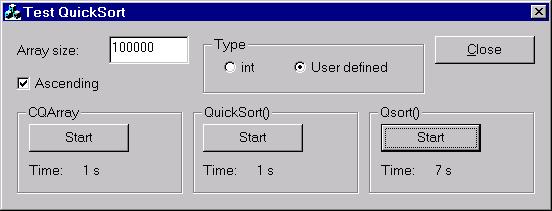Download demo project - 15 KbDownload source files - 2 KbThis is an updated version - thanks to Donald R. Kichline.
Motivation
From time to time, I need to sort arrays containing custom data types,
structures, or simple data types provided by C++. Because I use MFC and CArray,
I was looking for a nice solution. Here it is - my CQArray template class that
includes a quick sort method. In the first version I just provided array
template with quick sort method implemented. This is updated version, with
function template too. Good news, this release is faster than first one, and of
course, faster than qsort() function. Second one is, I extended it by
QuickSort() function template.
Description of solution
Sorry, I don't describe the quick sort algorithm. You should be aware that
the quick sort algorithm is the fastest sorting algorithm. It is recursive, and
based on partitioning the input array by some element.
In this release is new function template - QuickSort(). This template is
also used by CQArray template. Therefore, now it is possible to sort any array,
not just a CArray like array.
I kept it as simple as possible. With CQArray, you can construct any
template class. After construction, by simply calling QuickSort(), you will
sort the array. The function template QuickSort() works the same way.
Description of CQArray template
CQArray declaration and implementation:
template <class T, class PT> class CQArray : public CArray <T, PT>
{
public:
void QuickSort(BOOL bAscending = TRUE);
};
template <class T, class TP> void CQArray<T,TP>::QuickSort(BOOL bAscending)
{
if (GetSize() > 1)
{
::QuickSort(GetData(),GetSize(),bAscending);
}
}
Above you can see whole CQArray template. One and only method is
QuickSort(), parameter bAscending means sorting ascending (if TRUE), or
descending. Note, this method calls QuickSort() function.
Description of function template QuickSort
Declaration of QuickSort() function:
template <class T> BOOL QuickSort(T *pArr, int iSize, BOOL bAscending = TRUE);
Implementation is quite longer, please see to sources. First parameter is
address of array to sort. Second one is size of this array. Last one has same
meaning like CQArray::QuickSort() parameter. Function returns TRUE if success,
otherwise it returns FALSE. However, only one error can occur - bad
parameters.
Usage
Usage of CQArray is similar to a CArray:
...
CQArray <int, int &> intArr;
...
...
intArr.QuickSort();
...
Usage of QuickSort() function:
int data[100];
QuickSort(data,100);
Note, if you want to sort a custom type, you'll need to overload the
operators '<' and '>'.
Demo project
I provide simple demo project. You can see usage of template class and
function and compare performance of QuickSort() function with qsort() function.

You can set array size, type of elements in array and direction of sorted
array. My 'user defined type' is simple structure.
Comparision with qsort
As you can see on previous picture, in demo program you
can sort array in three ways. First one is with CQArray template, second
one QuickSort() function template and last one is qsort() function. Time
bellow is in seconds. My templates are faster than qsort() function.
It is not every time seven times faster, sometimes it is more or less. It
is based on array size, a larger array produces a better ratio.
This member has not yet provided a Biography. Assume it's interesting and varied, and probably something to do with programming.
 General
General  News
News  Suggestion
Suggestion  Question
Question  Bug
Bug  Answer
Answer  Joke
Joke  Praise
Praise  Rant
Rant  Admin
Admin 







